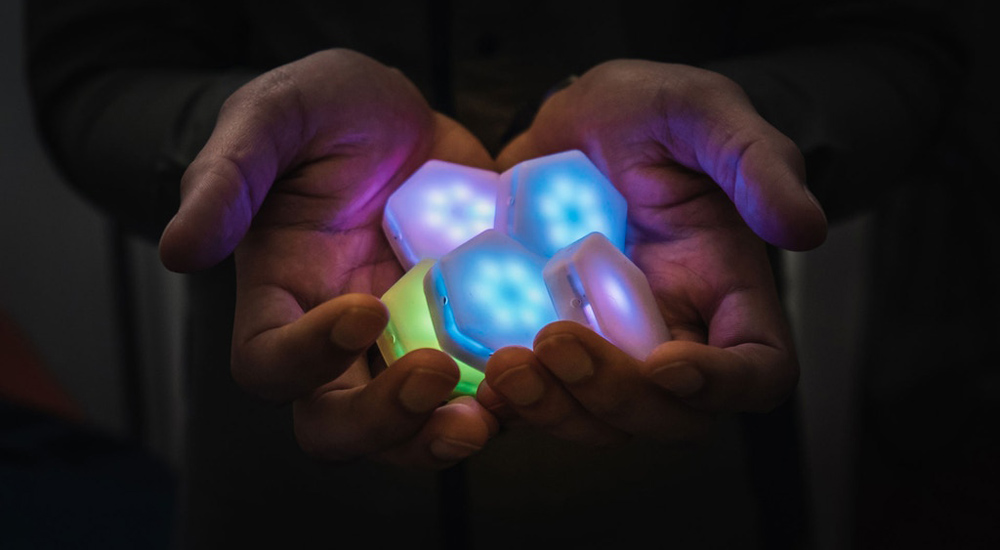
In the first month of spring, crowdfunding campaigns of several interesting projects came to an end: a
smart soul , a
virtual neighbor , and
another smart assistant for photographers . Alas, all three of the listed gadgets are not included in our selection, since their more pragmatic rivals have collected a lot more money.
# 1 The 6-in-1 Duffle Backpack Sport
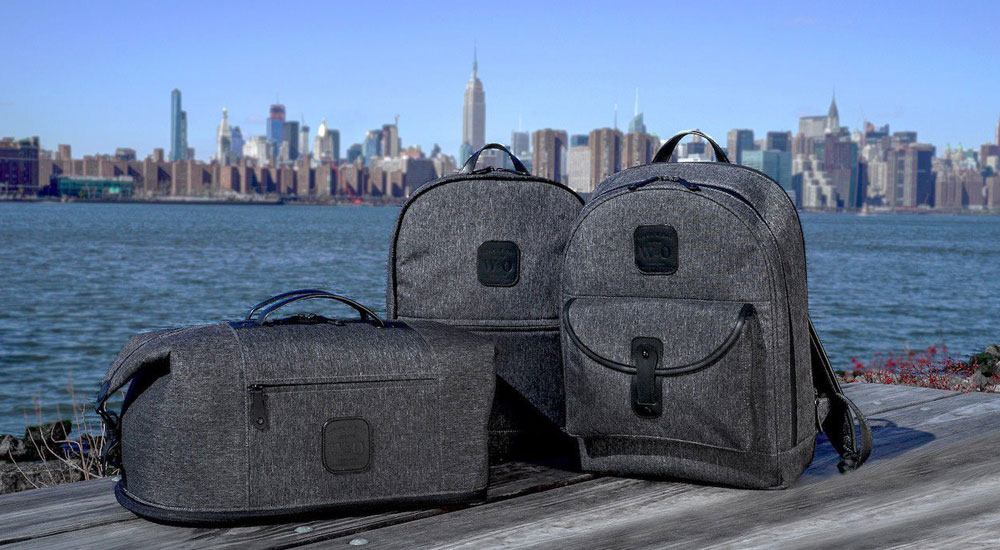 Collected:
Collected: $ 366,625 with a target of $ 100,000.
Deliveries: scheduled for October 2018 for Kickstarter backers.
Additional fees continue on Indiegogo .
Brooklyn startup Wool & Oak appeared in early 2016, after its founders successfully launched a stylish traveller's suitcase on Kickstarter. At the end of the same year, the designers returned to the crowdfunding platform with Duffle Backpack, a modular hybrid of a backpack and a bag. The last project turned out to be so popular that in March the company performed an encore with its updated, "sports" version.
The base of the system is a thin 8.8 liter Pro backpack. It has a reinforced laptop compartment with a diagonal of up to 15 inches and a pocket for a 10-inch tablet. If necessary, an additional backpack module is attached to the outside of the Pro with a zipper, which increases the volume by 14.75 liters. But if you need more space, then you should fasten the Duffle bag to the base, adding 32.77 liters of capacity.
Each module can be worn separately from the Pro. All three have pockets and pockets for documents, gadgets and accessories for them. The material for the bags is durable, waterproof lightweight nylon, which explains the name Sport - the original set was leather. Prices were as follows: $ 99 for a basic Pro backpack, $ 189 for a set of Pro and a module-backpack, $ 189 for a Pro and a module bag, and $ 259 for all three things.
# 2 Avya Nano Inhaler
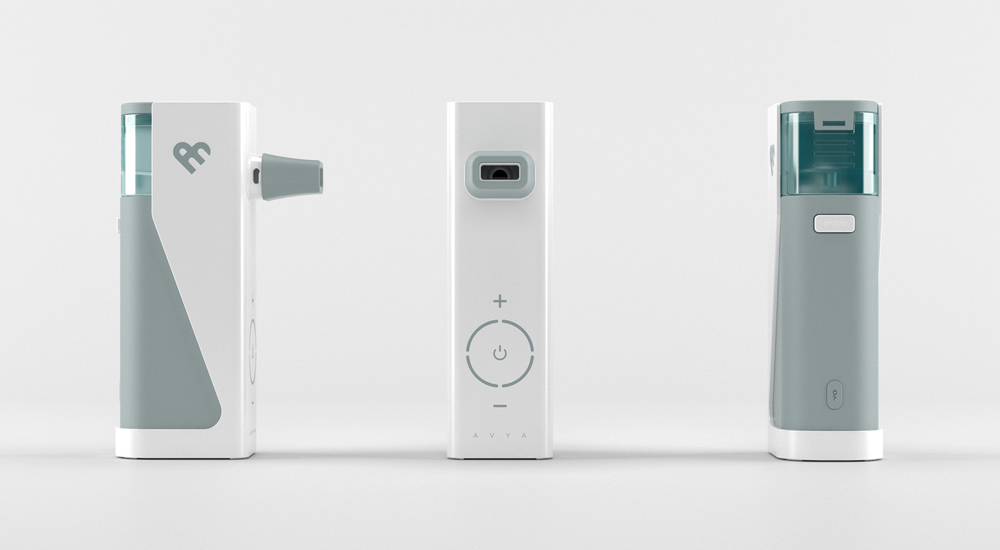
Raised
: $ 344,189 with a target of $ 25,000.
Deliveries: scheduled for May 2018 for Kickstarter backers.
Additional fees continue on Indiegogo .
Kickstarter has a very strict ban on any medical equipment. Apparently, for the company Aura Medical an exception was made: the Avya inhaler presented by it relieves allergies and asthma attacks, clears the nose, and also helps with colds. All this - thanks to nanotechnology. Rather, nano-pair.
Avya is a portable inhaler that is comparable in size to a water bottle. In front of it is a spout with a removable mouthpiece and a touch control panel for heating (which makes the inhaler a bit like an iPod), at the back is a small water tank. The device is rubberized to make it harder to drop. The gadget is powered by a battery, one charge of which should be enough for 120 minutes of the device.
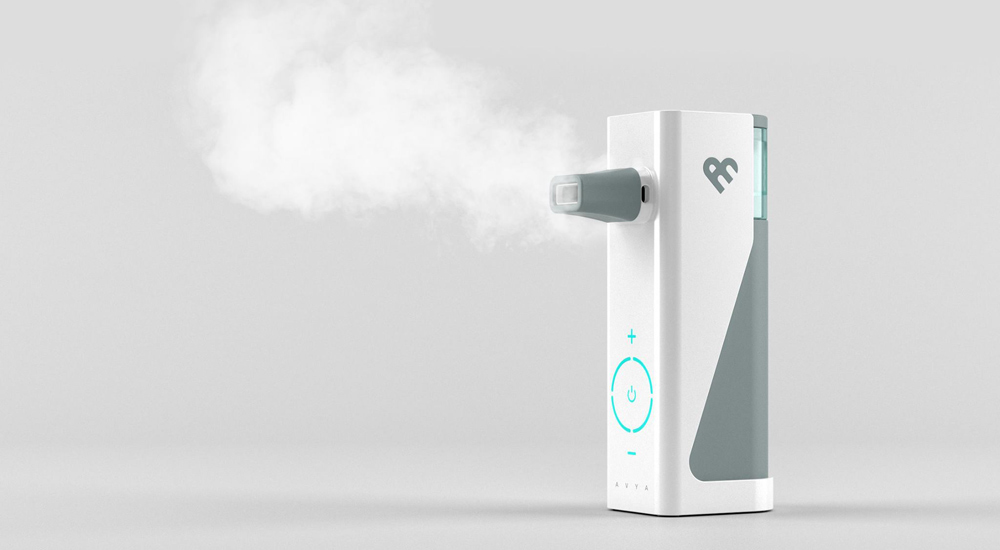
It is not ordinary water that is poured into the inhaler, but salt solution, which, according to the creators of the device, is sprayed onto particles of less than 5 microns each. The resulting nano-steam effectively cleans the nasal sinuses and helps eliminate infection and inflammation. The desired solution is easy to prepare yourself, but the lazy can buy branded capsules with Himalayan salt. Aura Medical is already selling larger versions of its inhaler. It remains to wait for the first reviews of backers to find out how well they managed to implement their own technology in a reduced format. The cost of ordering the inhaler ranged from $ 139.
# 3 Mu One Universal Charger
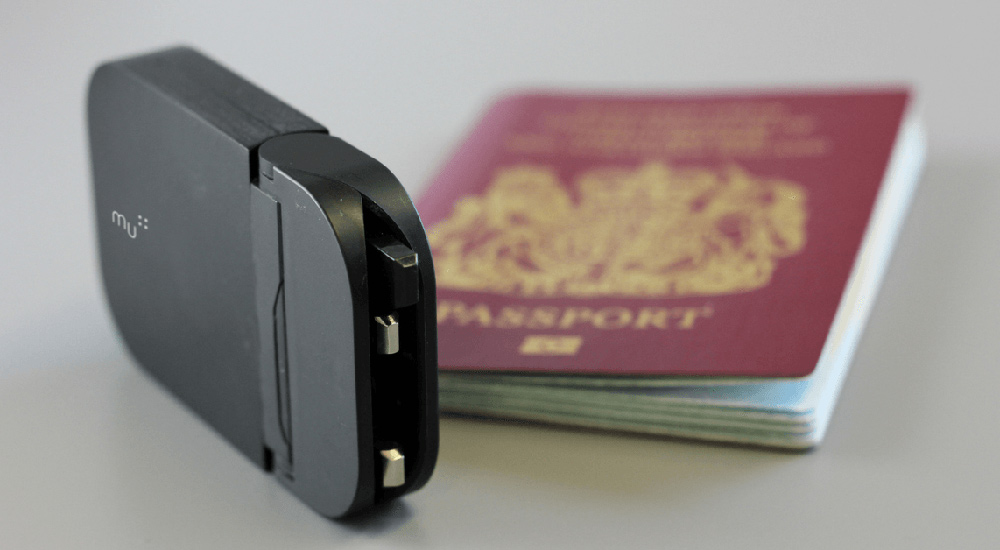
Raised
: $ 344,189 with a target of $ 25,000.
Deliveries: scheduled for May 2018 for Kickstarter backers.
Additional fees continue on Indiegogo .
Mu One is a universal charger that fits in your jeans pocket and works in 200 countries around the world. It consists of two parts: a case with a USB-C connector, and a replacement plug.

Included are three types of plugs: British (type G), European (type C) and North American (type A). The British, with three pins, is equipped with a turning mechanism, so that when folded it is completely flat. The pins of the American plug are hidden inside the nozzle, and the European plug turns so that the device can be plugged into the socket directly or at an angle.
The case is equipped with a chip for intelligent adjustment of the optimal power of the current, in addition, Mu One supports the PowerDelivery standard. The minimum charging power is 5 watts, the maximum - 45 watts. On Kickstarter, the device offered to order at a price of £ 39 apiece. For an extra £ 20, you could purchase a branded cable with Type-C.
# 4 Wireless GoSpace SD Card Reader
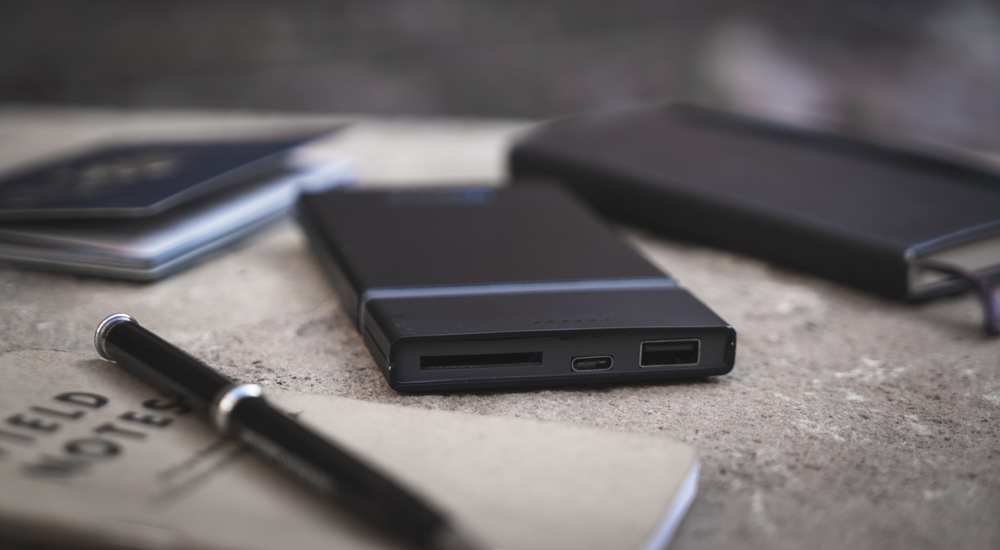 Collected:
Collected: $ 212,636 with a target of $ 20,000.
Deliveries: scheduled for May 2018 for Kickstarter backers.
Additional fees continue on Indiegogo .
It would seem that the card reader is a completely everyday thing and even less inclined to innovate than charging. However, on Kickstarter, even such a simple gadget is capable of breaking into the stars with proper feeding, which is what happened with a device called GoSpace.
GoSpace combines a card reader and a wireless power bank. As a card reader, the gadget reads SD memory cards (microSD and miniSD - if there is an adapter), and connects via Wi-Fi to eight devices at once. Up to 1TB cards are supported, with wireless data transfer rates up to 867 Mbps. If you need faster, then it is enough to connect the card reader with a cable to the USB-C port - then the speed will jump up to 10 Gbit / s. To work with files, the GoSpace application is required, it is synchronized with Dropbox and Google Cloud.

The volume of the GoSpace battery is 5500 mAh, which is enough for the device itself for 10 hours of continuous operation. Other gadgets are charged either by induction, Qi standard, or wired via the USB-A connector. On Kickstarter poverbank / card reader cost from $ 59. Its retail price will be $ 99.
# 5 Vortecon Kinetic Fijet
 Collected:
Collected: ~ $ 182,744 with a target of ~ $ 2,830.
Deliveries: scheduled for June 2018 for Kickstarter backers.
Additional fees continue on Indiegogo .
On Kickstarter, there is a long tradition of kinetic toys that exists and feels good (regardless of external trends). Its typical representative is the cylindrical "Yule" Vortecon.
The gadget is presented in three versions: steel, brass and copper. Each copy is machined from a single piece of metal on a CNC machine. At the base is a stainless steel bearing, which is covered on top with a removable leather cover. A furrow in the form of a spiral is applied to the surface of the toy, forming a curious optical illusion during rotation.
For one such spinning paperweight, its creators asked for £ 21. Phidget spinner is dead, long live fidget spinner.
# 6 Taskin Kompak System Modular Bags
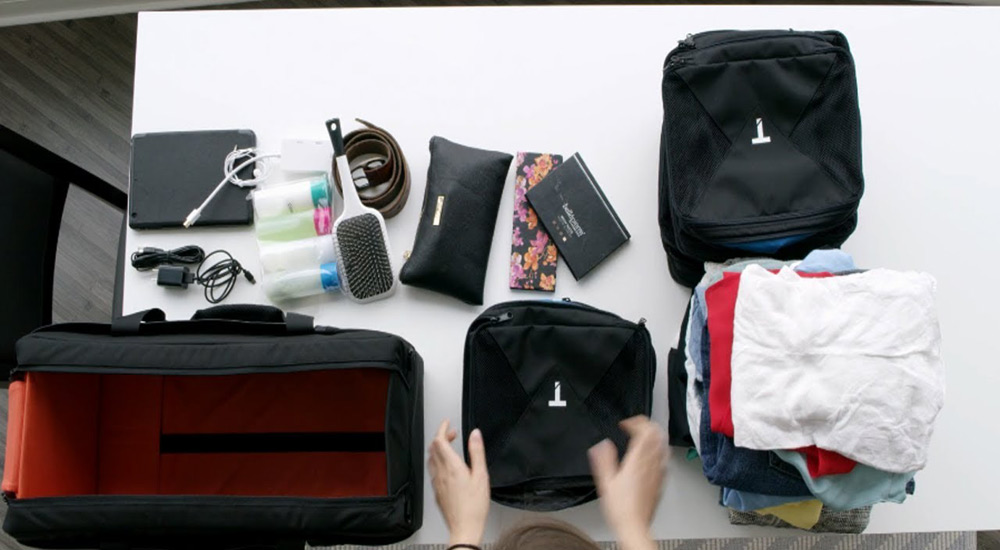
Raised
: $ 179,970 for a target of $ 7,000.
Deliveries: scheduled for June 2018 for Kickstarter backers.
Additional fees continue on Indiegogo .
Startup Taskin is committed to consistently improving his invention - an organizer bag for clothes Kompak. It consists of two sections: breathable for clean clothes and sealed for wet and dirty. Compression lightning passes between them, just close it - the “cube” compresses its contents to a compact size.
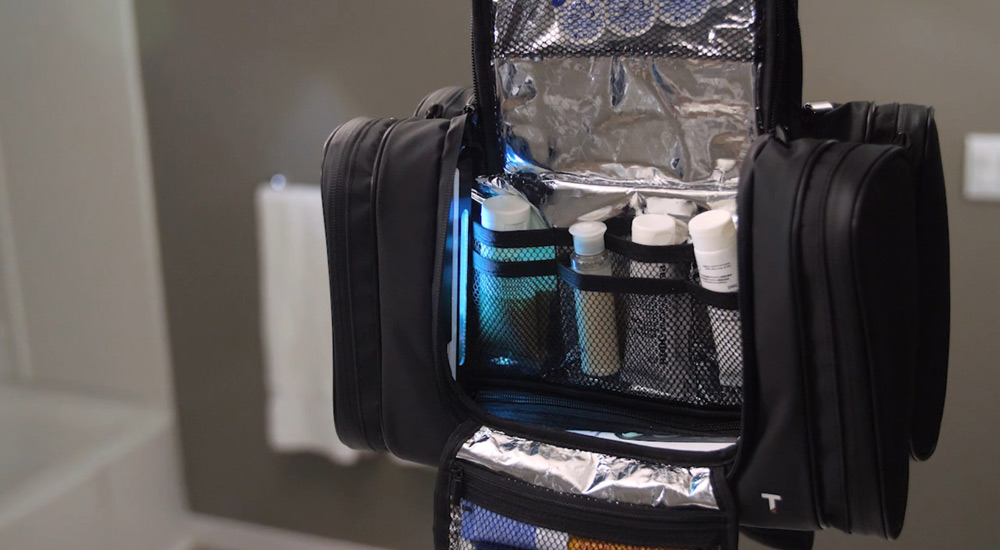
This time, the old "cube" presented in the company several new bags. The most high-tech of them - Kruze, waterproof bag for toiletries. It incorporates an ultraviolet lamp that automatically kills bacteria on brushes, vials and razors stored inside. In addition, the bag opens and is attached to the wall or to the mirror on the suction cup.
Less impressive add-ons: an organizer bag for gadgets, wires, and charging; storage bag for two pairs of shoes; and an ordinary travel bag that folds to the size of a small drive. All these things could be ordered in different combinations, along with the “cubes” and the travel bag, invented specially for them - Kube Duffel. The cost, depending on the configuration, ranged from $ 24 to $ 200.
# 7 Snorelax Patch Plaster
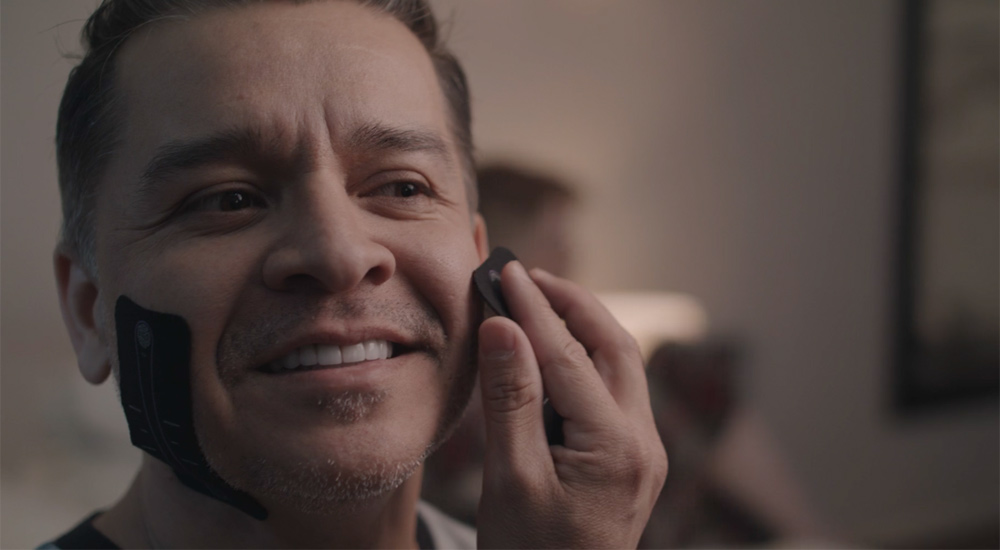
Raised
: $ 179.119 with a target of $ 14,500.
Deliveries: scheduled for May 2018 for Kickstarter backers.
Additional fees continue on Indiegogo .
Innovators regularly exhibit their solutions to the problem of snoring on crowdfunding platforms. In a startup Snorelax know this, but still insist that they have come up with the best way to calm the rolling night serenades.
This patch, which is attached on both sides of the face, from the cheekbones to the chin line. He holds his jaw in place. Due to this, the sky and the tongue during sleep do not descend and do not block the airway. In addition, the plaster does not interfere with opening and closing the mouth when worn. The main material is soft cotton, and the strips are attached to the face with a special adhesive composition. Bearded plaster can be used without fear of accidental hair removal, because the glue is not so strong.
One pack of Snorelax contains a monthly supply of patch. For backers on Kickstarter, the price was set at $ 20, retail strips will cost almost twice as much.
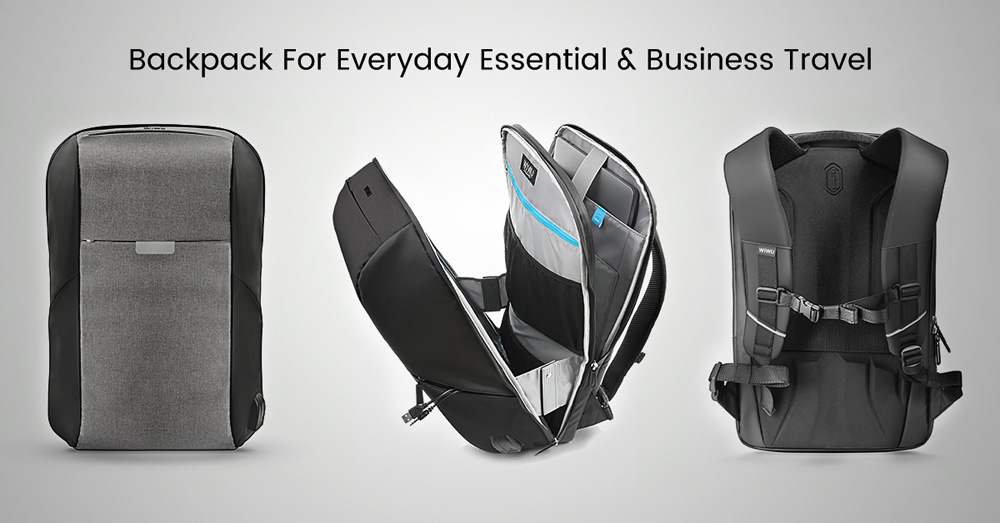 Collected:
Collected: $ 173,633 with a target of $ 10,000.
Deliveries: scheduled for April 2018 for Kickstarter backers.
Additional fees continue on Indiegogo.Bobby, the “anti-theft” backpack from XD Design , has definitely touched some sensitive strings in the souls of people coming up with crowdfunding projects. Nothing else can explain the whole squall of backpacks, in which here and there familiar features appear. OnePack is a typical representative of the trend.
The design of the backpack is made in the familiar, bored minimalist style with simple lines and functional reflective elements. The material is waterproof material Dupont 600D. On the right is the USB-output, which is connected to the hidden inside the bank. True, the minijack for headphones was located nearby, which had not been noticed before for such bags. The volume of internal space is 20 liters, it is divided into numerous pockets and sections for better organization of things (including a 17.3-inch laptop compartment).

In addition, the OnePack has a rudimentary protection against thieves in the form of a strap with a buckle, with which the backpack clips onto something. The cost of the pre-order backpack was $ 69.

Raised
: $ 164,547 with a target of $ 12,322.
Deliveries: scheduled for May 2018 for Kickstarter backers.
As you noticed for the most part of the current compilation, on Kickstarter financial projects are boring, without a spark. Fortunately, Paul Potato is not such a project. This is a tower for vertical potato growing.
The system is simple, as all ingenious, and consists of several trays of triangular shape. They are joined like Lego cubes and form a tower that needs to be filled with earth. Then potatoes are planted in the corners, and grows on an area ten times smaller than with traditional cultivation in the soil. The bottom of each tray is covered with a network of holes for the best distribution of moisture throughout the tower. If Paul Potato is used indoors, there is a branded stand for it (for collecting water). The trays are offered in two versions - plastic and steel, heavier (2.2 kg and 12.9 kg).
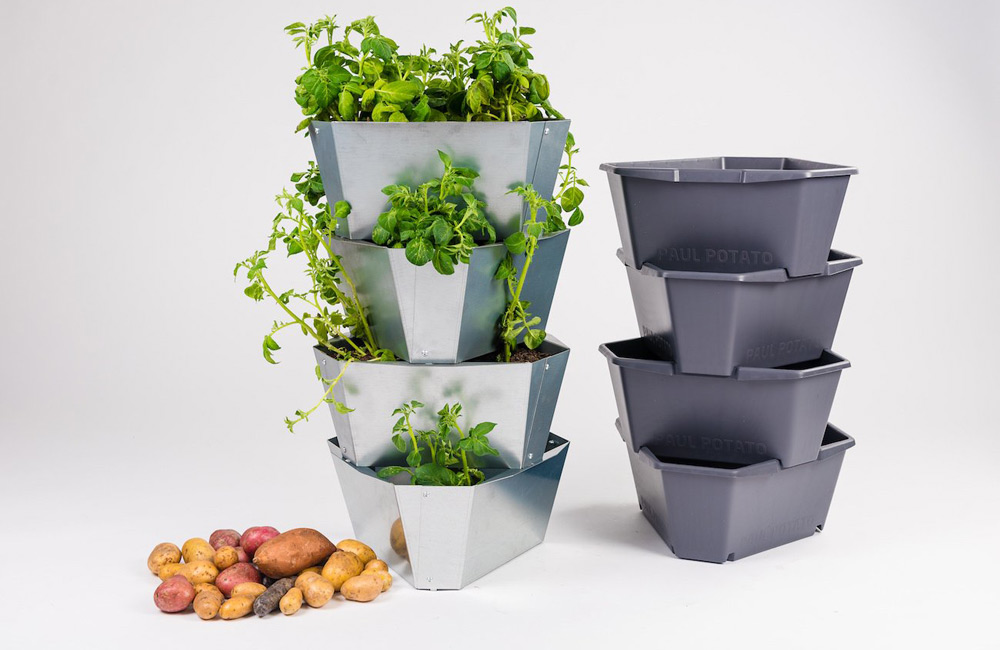
The tower was designed for two years by the Austrian startup Gusta Garden. Its designers consulted with gardeners and experts from the University of Vienna's Natural Resources, and all for the sake of the most beautiful and effective pot for potatoes. Backers could order Paul Potato for € 39.
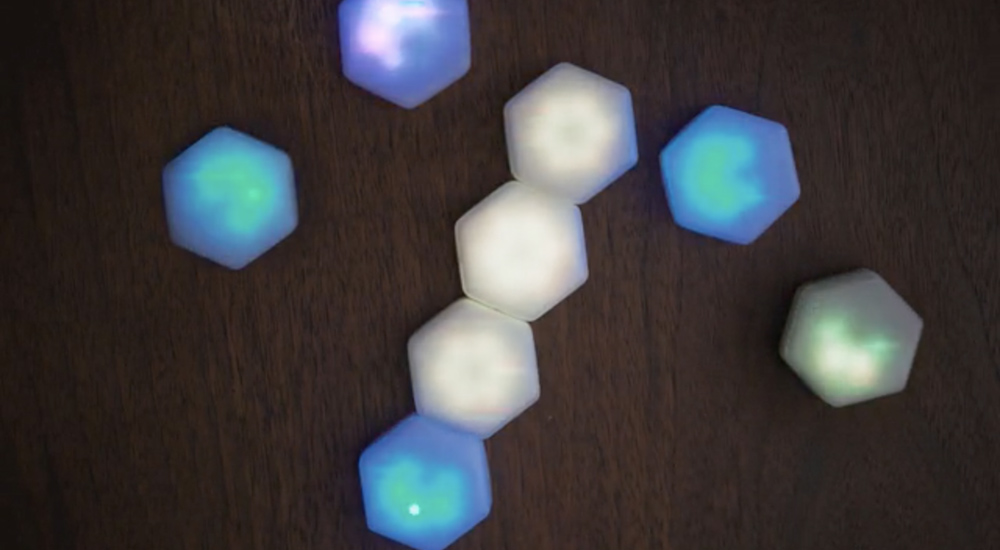
Raised
: $ 344,189 with a target of $ 25,000.
Deliveries: scheduled for May 2018 for Kickstarter backers.
The Blinks board game is easier to describe as a video game, cut off from the screen and transferred to reality. She came up with the team Move38 under the leadership of designer Jonathan Bobrov, who had previously engaged in the design of interactive museum installations.
Blinks is developed on the basis of Arduino and consists of hexagonal elements that are attached to each other by magnets. Each element is programmed to a specific game, indicated on its bottom. To temporarily "explain" the rules of the game to the rest of the pieces, it is enough to combine them. During the game, Blinks change color and flicker frequency. Since the architecture of the electronic “desktop” is open, if you wish, anyone can program their own game for LED cells.
The minimum set of Blinks contains six items. Each of them is powered by a separate watch CR2032 battery, the charge should be enough for 6 months of work. The cost of the kit for backers starts from $ 49.

